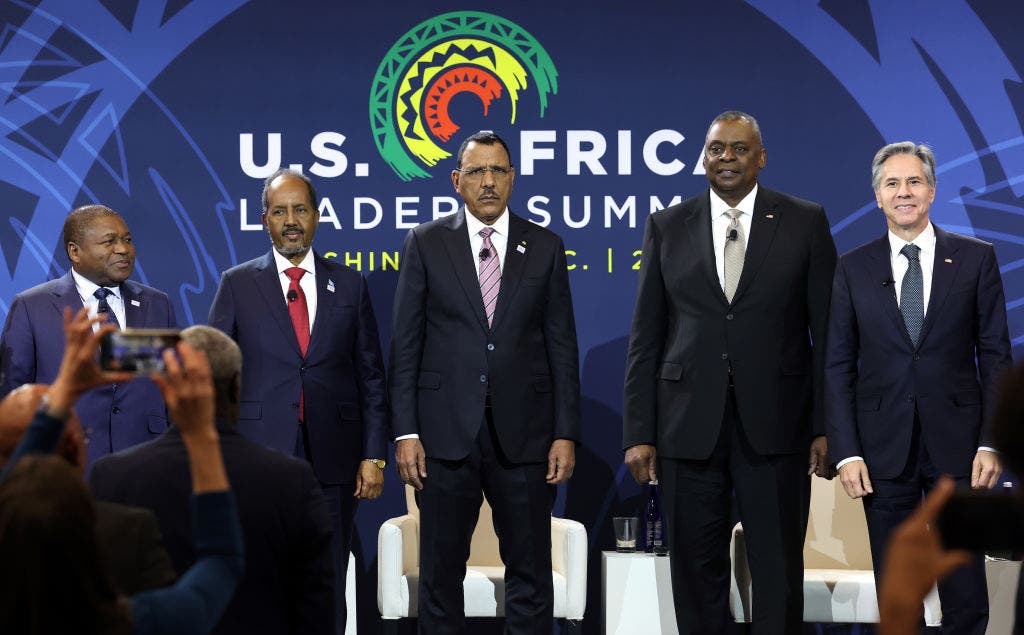JOHANNESBURG, South Africa — The U.S. is, according to some analysts, “playing catch-up” with Russia and China again, as President Biden hosts 49 African heads of state and royalty at the U.S.-Africa Leaders Summit in Washington this week.
Russia, China and various European countries have all recently either wooed leaders at African summits of their own or surged ahead with economic and sometimes clandestine military assistance on the continent.
This is, however, the first U.S. Summit in eight years, with President Biden saying he hopes “to continue strengthening our shared vision for the future of U.S.-Africa relations.”
This is happening against a massive cloud of Islamist terrorism sweeping the African continent. Africa is now the center of operations for both Islamic State and al Qaeda. Insidious economic infiltration and inevitably accompanying coercion, under the guise of assistance by Russia and China, is rampant, and Kremlin-sponsored private armies are operating brazenly in an increasing number of countries as Russia strips them of their mineral wealth.
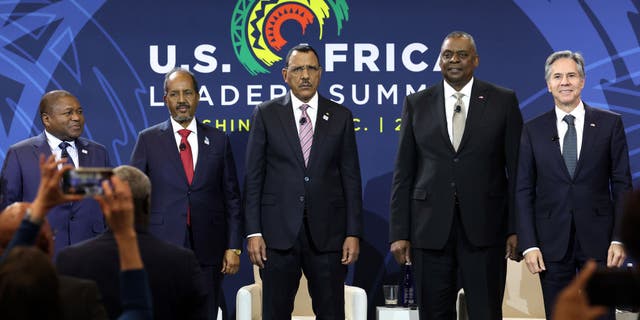
(L-R) President of Mozambique Filipe Nyusi, President of Somalia Hassan Sheikh Mohamud, President of Niger Mohamed Bazoum, U.S. Defense Secretary Lloyd Austin and U.S. Secretary of State Antony Blinken arrive for the Peace, Security, and Governance Forum during the U.S.-Africa Leaders Summit Dec. 13, 2022, in Washington, D.C.
(Kevin Dietsch/Getty Images)
AFRICA: THE NEW GROUND ZERO FOR JIHADI TERROR GROUPS, EXPERTS SAY
The aim of the summit, according to the State Department, is to foster economic engagement and advance peace and security among many other goals.
“The U.S. is clearly playing catch-up in Africa, relative to other powers which tend to see the opportunities Africa presents,” Cameron Hudson, senior associate in the Africa Program at the Washington-based Center for Strategic & International Studies told Fox News Digital.
Hudson, the former director of African affairs for the National Security Council during the George W. Bush Administration, noted “Washington continues to view its engagement in Africa from a problem-solving perspective. … We tend not to see the need to create strong alliances with African states to confront the pernicious influence of malign actors like Russia.”
The view from Africa itself is not much different.
“Just gathering several African heads of state does not necessarily imply the U.S. will be able to achieve its objectives,” Gustavo de Carvalho, senior researcher of African governance and diplomacy at the South African Institute of International Affairs (SAIIA), told Fox News Digital from Johannesburg.
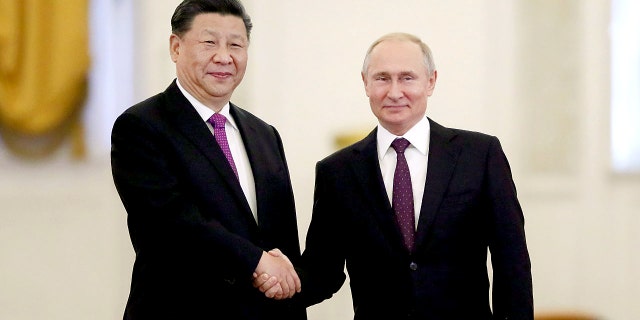
China and Russia both enjoy a growing influence across the African continent.
(REUTERS/Evgenia Novozhenina/Pool)
Referring to the Biden administration’s attention on the region, he added, “It often reads that Africa is a theater rather than the focus itself. If the U.S. incentives in the continent are simply to counter Russia and China, their ability and interests to effectively create a meaningful partnership will be diminished.”
The administration is also expected to be pushing its agenda aimed at rolling back climate change at the summit. But, in the Democratic Republic of the Congo, huge parts of a rain forest vitally needed to swallow up carbon emissions are being sold to oil and gas exploration exploiters by a government that claims its poor populace needs the income.
RUSSIA AND US JOCKEY FOR SUPPORT ACROSS AFRICA
Many in Africa argue that they need to stay warm, to cook food and can’t afford to worry about saving the planet. Soweto is South Africa’s largest township, an area where historically the previous white apartheid government forced people of color to live. In winter months, it’s possible to see where Soweto is from the yellow sulfurous cloud that hangs over it, fumes from thousands of fossil-fueled fires. The cheapest way for people to stay warm here is by burning coal.
“The concern from many African countries relates to the fact that developed economies, like the U.S., have historically been the principal carbon emitters and primarily contributed to the current climate change crisis,” said De Carvalho, describing a common African viewpoint. “African nations demand proportionality in many issues, including compensation for environmental damage. The role of the U.S. should not simply be to put pressure on African countries but find common solutions to the environmental crisis we currently face.”
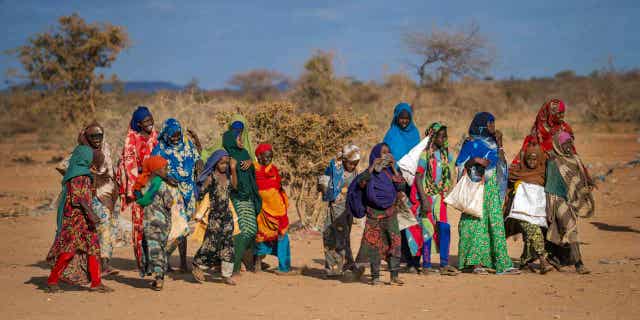
People arrive at a displacement camp on the outskirts of Dollow, Somalia, on Sept. 19, 2022. Somalia has not yet fallen into famine but several parts of the country are in danger of it in the coming months, according to a new food security report on the Horn of Africa’s worst drought in decades that was released on Tuesday Dec. 13, 2022. (AP Photo/Jerome Delay, File)
(AP Photo/Jerome Delay, File)
President Biden will also look to tackle the Kremlin’s threat to food security in Africa in discussions with leaders Thursday. National Security Advisor Jake Sullivan told reporters Monday that “food security and food systems resilience is a critical issue for our African partners who have been disproportionately impacted by the rise in food and fertilizer prices and disruptions to global supply chains as a result of Russia’s war against Ukraine.”
It’s not known whether Washington can apply much successful leverage on those African countries who have been supplied with much-needed grain by Moscow in return for support for the Russian invasion of Ukraine.
The State Department is also planing to tackle good governance. Four countries where that is not happening — Mali, Sudan, Guinea and Burkina Faso — have not been invited to Washington, but several others with what observers say are shocking human rights and governance records will get to enjoy the silver service at the White House at President Biden’s welcome dinner.
BLINKEN FLIES INTO ‘SUPERPOWER’ BATTLEGROUND IN AFRICA
Then there’s the leader of arguably Africa’s flagship country, South Africa, Cyril Ramaphosa. He is not attending the summit and is under a cloud of accusations of money laundering.
An alleged sum of more than $4 million is claimed to have been hidden in a sofa at the president’s game farm. Ramaphosa is said to claim the amount of cash is far smaller — nearly $600,000 — and claimed it has been stolen. Any such amount should have been reported to currency exchange control authorities but reportedly was not.
Ramaphosa has been unable to account for why he, as president of one country, needed to have a substantial amount of another country’s cash hidden in his sitting room, claiming it was payment for a sale of buffaloes.
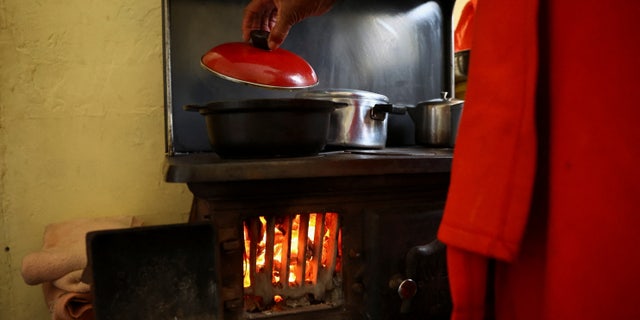
Pinkie Sebitlo cooks using a coal stove during frequent power outages from South African utility Eskom caused by its aging coal-fired plants in Soweto, South Africa, June 23, 2022.
(REUTERS/Siphiwe Sibeko)
Johannesburg-based analyst Ebrahim Fakir believes Ramaphosa, who came to power on an anti-corruption ticket after a tsunami of charges were laid against former President Jacob Zuma, should voluntarily resign.
“There are certain findings that find he has contravened his own office, the constitution and certain provisions in the law,” Fakir, director of the AUWAL Socio-Economic Research Institute told local broadcaster SABC.
CHAOS SPREADS IN SOUTH AFRICA AS AUTHORITIES STRUGGLE TO CONTAIN LOOTING, VIOLENCE
Another reason why Ramaphosa isn’t at the summit is he’s under increasing criticism for another corruption-based issue. Under his watch, businesses are struggling to survive because the state-run power company currently cuts electricity to factories and homes for 7-9 hours a day. Corrupt politicians and managers have reportedly siphoned off the funds needed to maintain South Africa’s power stations to the point that, over the past year, there have been more power outages arguably than even in Ukraine, a country at war.
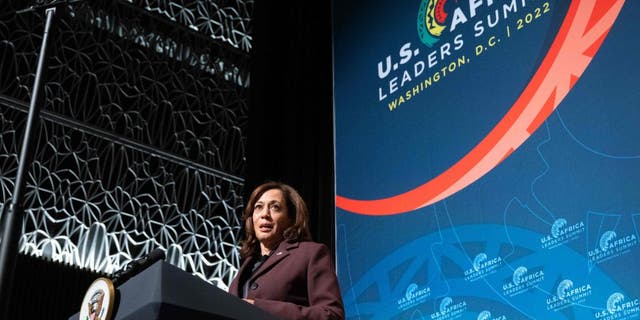
U.S. Vice President Kamala Harris speaks during the African and Diaspora Young Leaders Forum at the National Museum of African American History and Culture during the U.S.-Africa Leaders Summit in Washington, D.C., Dec. 13, 2022.
(Saul Loeb/AFP via Getty Images))
Biden will dangle some pretty large carrots this week to try and win more friends in Africa. Sullivan indicated the president is likely to announce his first Sub-Saharan official visit at the summit and offer U.S. backing for Africa to get a permanent seat at the G-20 table.
CLICK HERE TO GET THE FOX NEWS APP
“The Biden Administration has recognized that it needs to modernize its approach” says the CSIS’s Hudson, adding, “For this summit to be considered a success, African leaders need to walk away with a stronger sense that Washington has changed its approach and will engage the continent on a more equitable footing.”
(Except for the headline, this story has not been edited by PostX News and is published from a syndicated feed.)

